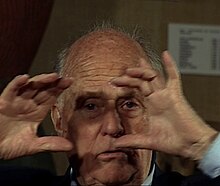
Back Jean Rouch Afrikaans جان روش Arabic جان روش ARZ Жан Руш Bulgarian Jean Rouch Czech Jean Rouch German Jean Rouch Spanish Jean Rouch Basque ژان روش Persian Jean Rouch Finnish
Jean Rouch | |
|---|---|
 | |
| Born | Jean Rouch 31 May 1917 Paris, France |
| Died | 18 February 2004 (aged 86) Birni-N'Konni, Niger |
| Nationality | French |
| Occupation(s) | Filmmaker, anthropologist |
| Years active | 1947–2002 |
| Notable work | Moi, un noir (I, a Negro), Chronique d'un été (Chronicle of a Summer), La Chasse au lion à l'arc (Hunting the Lion with Bow and Arrow), Petit à petit (Little by Little) |
| Relatives |
|
| Part of a series on the |
| Anthropology of art, media, music, dance and film |
|---|
 |
| Social and cultural anthropology |

Jean Rouch (French: [ʁuʃ]; 31 May 1917 – 18 February 2004) was a French filmmaker and anthropologist.
He is considered one of the founders of cinéma vérité in France. Rouch's practice as a filmmaker, for over 60 years in Africa, was characterized by the idea of shared anthropology.[1][2] Influenced by his discovery of surrealism in his early twenties, many of his films blur the line between fiction and documentary, creating a new style: ethnofiction. The French New Wave filmmakers hailed Rouch as one of their own.
Commenting on Rouch's work as someone "in charge of research for the Musée de l'Homme" in Paris, Godard said, “Is there a better definition for a filmmaker?".[3][4][5][6]
- ^ Jean Rouch is an inspiration for the project… though at the epicentre of auteur culture he saw his film-making practice as a collaborative venture, a ‘shared anthropology’ as he called it – note by Mandy Rose (2010)
- ^ Anthropological Film, Adventures with Jean Rouch – article by Philo Bregstein at DER, 2005
- ^ Cahiers du Cinéma, 94 (April 1959)
- ^ "Jean Rouch at the Comité du film etnhographique". Archived from the original on 30 May 2019. Retrieved 8 March 2019.
- ^ Quotes on Jean Rouch at Googreads
- ^ Jean Rouch and D. W. Griffith – article by Richard Brody at The New Yorker